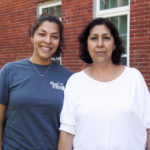Given the months-long conjecturing about what Pope Francis might say in his encyclical on the environment, the actual teaching document contains few surprises. Still, it’s must-reading for all of us who inhabit this planet. The Holy Father lays out his concern for stewardship of God’s creation within the framework of our intertwining relationships with God, neighbor and the earth itself. He titled his encyclical Laudato Si, (Praise be to you), based on the words from the canticle of Saint Francis of Assisi.
Pope Francis says we have stressed the earth with our overconsumption and the people suffering the greatest consequences are the poor and marginalized. That must stop. A champion of the poor long before becoming pope, he speaks passionately about the mandate of the haves to share with the have-nots, to the point of making sacrifices and changing our lifestyles. The pope asks: “What kind of world do we want to leave to those who come after us, to children who are now growing up?” It’s not a rhetorical question; it’s one we need to contemplate individually and collectively.
“This (encyclical) is really a theology of relationship,” says Father Bud Grant, an environmental ethicist and professor at St. Ambrose University in Davenport. “Environmental crises are threads which, when tugged, unravel our social, economic, cultural and spiritual fabric. To address one is to address them all. The common good must be kept at the forefront. It does not conflict with individual human rights; it is the source of those rights and our responsibilities for caring for creation.”
America magazine’s Father James Martin, S.J., identifies 10 “takeaways” from the encyclical in a June 18 article (online, at www.americamagazine.org). Among the takeways: spiritual perspective is now part of the discussion on the environment; the poor are disproportionately affected by climate change; everything is connected, including the economy; global dialogue and solidarity are needed. Fr. Martin’s short article makes a good point up to the 100-plus-page encyclical.
Sister Simone Campbell, S.S.S., of Network, a national Catholic social justice lobby, says the encyclical calls us “to be converted from a ‘throw-away culture and an economy of exclusion — the cause of our current crisis — to solidarity and care for the vulnerable.” The 2014 Pacem in Terris Peace and Freedom Award recipient says Pope Francis affirms the important and necessary role of government at all levels. She calls on all of us to pressure our elected leaders to set aside short-term thinking for the sake of long-term solutions.
Some Catholics, including a couple of presidential candidates, think Pope Francis should tend to his flock and stay away from what they regard as secular issues. That position is contrary to Catholic faith. Our faith should inform all aspects of our life — individual and communal. There is nothing “off limits” as far as the Gospel is concerned.
In his response welcoming the encyclical, Archbishop Joseph Kurtz, president of the U.S. Conference of Catholic Bishops, acknowledges that disagreement exists. He writes: “Genuine efforts to true dialogue will require sacrifice and the confronting of good faith disagreements, but let us be encouraged that at ‘the heart of this world, the Lord of life, who loves us so much, is always present.’”
Pope Francis isn’t claiming to have the final word, Fr. Grant says. Laudato Si is meant to deepen and broaden the conversation in parishes, schools, campuses, boardrooms and centers of power.
So, let’s begin the discussion, by considering the practical applications of Pope Francis’ call to change. He invites us to ecological conversion, while acknowledging that it’s not easy to reshape habits and behavior. He calls for education and training because change isn’t possible without it. He asks us to aim for a change in lifestyle, which could bring healthy pressure to bear on those who wield political, economic and social power. He says we should offer the poor a life made worthy through labor.
How do we make that happen? What does that change look like on the ground, at the grassroots level? Please send your suggestions to arland-fye@davenportdiocese.org or by mail to The Catholic Messenger, 780 W. Central Park Ave., Davenport, Iowa, 52804. Attention: Barb Arland-Fye.
Your participation in this discussion can help answer the big question: What kind of world do we want to leave to those who come after us?
Barb Arland-Fye











